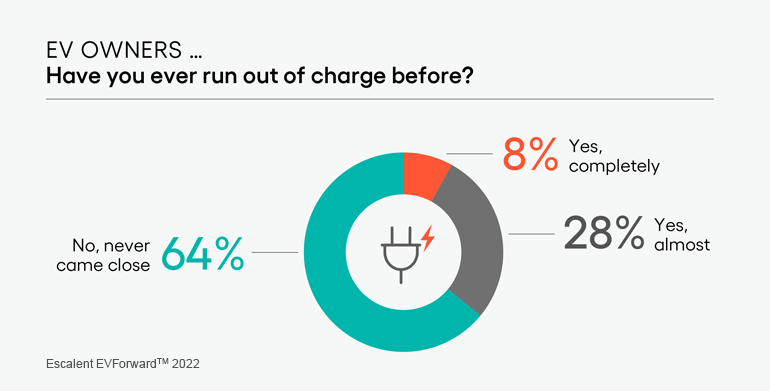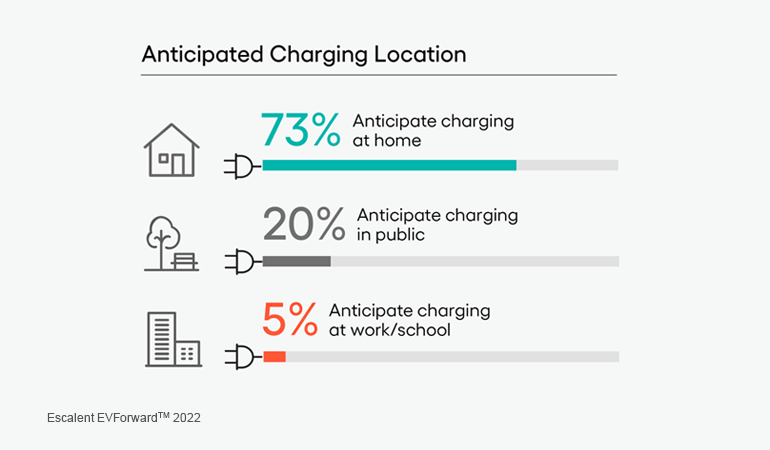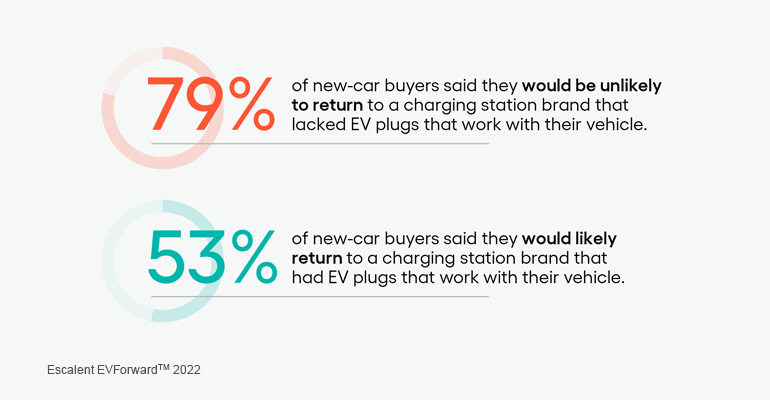
New findings from Escalent challenge prevailing perceptions around electric vehicle (EV) range and highlight the ease and reliability of ownership. However, while home refueling has won over consumers, public charging infrastructure leaves considerable room for improvement—with a leading provider yet to emerge.
That’s according to our 2022 Charging Infrastructure DeepDive report by EVForward—the most extensive study of the next generation of EV buyers. The DeepDive explores consumer expectations for home and public charging and identifies opportunities to position solutions for future EV owners.
The EV Range Anxiety Barrier
Although consumers consistently cite range anxiety as an obstacle to EV purchase, we found that only 8% of EV owners have ever completely run out of charge.
Meanwhile, 64% say they have never come close, revealing a stark disparity between the expectations and reality of living with an EV. In contrast, more than one in five new car buyers states they have run out of gas at least once in their life.

EV ownership may be easier than the majority of drivers expect. Nonetheless, assumptions around range limitations pose a genuine threat to broad adoption, emphasizing the importance of robust public charging infrastructure. Mobile charging services—such as those currently piloted by AAA—can also help reduce the fear of an empty battery on the open road.
The Popularity of Home Charging
Increased public charging infrastructure may help quell consumer doubts. However, providers face limited demand. Home charging is easy, convenient and accessible—something EV drivers fully embrace.
EVForward respondents have consistently exhibited a larger appetite for home charging than public charging. According to our most recent data, EV owners expect 73% of their refueling to happen at home. They anticipate charging in public, at work or at school only 25% of the time.

This simultaneously demonstrates the need for a comprehensive public charging system along with the narrow market share that providers can expect to claim. If the federal government’s National Electric Vehicle Infrastructure (NEVI) Formula Program—which aims to facilitate corridor charging every 50 miles—can meet its goals, then it could go a long way toward addressing the challenges.
The shift toward EVs and home charging will impact existing refueling infrastructure, too. As more consumers embrace EVs, fewer customers will be visiting gas stations. That said, those who do will be there longer as they wait for their car battery to recharge. To adapt to this change, gas stations and convenience stores will need to adjust their model to provide the amenities that EV drivers favor, such as cafés with Wi-Fi.
Shopping Around for EV Charging Solutions
When purchasing home EV charging technology, dealerships and auto manufacturers are the preferred choice for consumers, with 43% calling them the ideal location to shop for a charger.
Electric utilities are a distant second, capturing only 17% of the market, followed closely by options such as physical stores and online retailers. While utilities have the potential to differentiate themselves from the rest of the pack, they are currently underperforming.
Simple steps—for example, advertising rebates and incentives on paper bills and online—can help utilities spread awareness, attract customers and establish themselves as a source of truth.
Winning EV Charging Customer Loyalty
Among public charging providers, consumers have yet to pick a favorite. Only one in five respondents reports noticing a specific charging brand in their daily life, with Tesla achieving the highest levels of recognition.
As manufacturers—including Mercedes-Benz, General Motors and Ford—announce investments in their own charging infrastructure, it is clear that major players recognize the need for public charging and are willing to build dependable, accessible infrastructure.
To lead the market, brands must focus on compatibility and reliability, ensuring that their public charging solutions are convenient and universal. A resounding 79% of respondents say they would be unlikely to return to a charging network’s stations that lacked compatible plugs with their vehicle. In addition, 40% say that if the charger they pulled up to was not in working order, then they would seriously consider never returning to that brand’s stations again.

Although standards for public charging are high, consumers remain mostly brand agnostic. When asked whether they would prefer using the same charging brand in public as they use in their home, 61% say they don’t care one way or another—presenting a substantial opportunity for the brand that is willing to build a platform around public charging.
Boosting Public EV Charging Infrastructure
EV owners and prospective buyers rarely expect to use public charging. Despite this, they want to know that it is available to address the gaps that home charging cannot fill. Many vehicle shoppers hesitate to switch to an EV for fear of running out of charge on longer trips. A stronger public charging infrastructure can help ease consumer concerns.
While range anxiety may not reflect the lived experience of EV owners, the psychological barrier it represents for would-be owners is real. As charging stations become an increasingly familiar sight, they have the potential to change the narrative for good, removing a powerful hurdle for tomorrow’s EV buyers.
To learn more about EVForward and how we can help you tailor your strategy to better reach future EV buyers, click the button below.
About the 2022 EVForward™ Charging Infrastructure DeepDive
This EVForward DeepDive was conducted among a national sample of 1,218 respondents—with 53 EV Owner, 423 EV Intender, 488 EV Open, and 254 EV Resistant respondents as identified by Escalent’s algorithm—between August 8 and August 31, 2022. These respondents are a subset of the EVForward database, a global sample of more than 50,000 new-vehicle buyers age 18 to 80, weighted by age, gender, race and location to match the demographics of the new-vehicle buyer population and by vehicle segment to match current vehicle sales. The sample for this research comes from an opt-in online panel. As such, any reported margins of error or significance tests are estimated and rely on the same statistical assumptions as data collected from a random probability sample. Escalent will supply the exact wording of any survey question upon request.
Note: This blog was updated on March 26, 2025.










